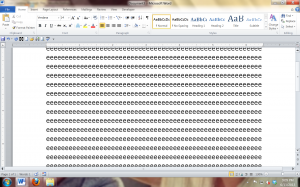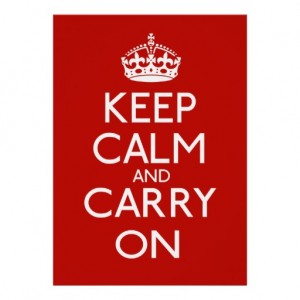 Despite my habit of blogging late at night, I usually don’t fall asleep on the job. Usually. The other night, however, my head dropped and I was gone, fingers resting on the keyboard. Twelve pages of eee’s later, I awoke and laughed at the result of my black-out, glad no one had seen me.
Despite my habit of blogging late at night, I usually don’t fall asleep on the job. Usually. The other night, however, my head dropped and I was gone, fingers resting on the keyboard. Twelve pages of eee’s later, I awoke and laughed at the result of my black-out, glad no one had seen me.
Today on the news I heard the story of a fellow keyboard-sleeper. A bank employee in Germany had arrived at work short on sleep, but his listless condition didn’t keep him from having an exciting day. While making a routine bank transfer of 64.40 Euros ($82.89 in US dollars), he fell asleep mid-transfer with a finger resting on the 2-key. As his brain was in zzzz-mode, his computer made a transfer of $222,222,222.22.
That was one expensive nap. His bogus transaction (which slipped past his wide-awake supervisor) cost his boss his job and the mess that resulted ended up in court.
All of us need to stay alert through our days and years. If we don’t, the consequences will be far more serious than multiple computer screens of letters and numbers. It’s no surprise Scripture details examples of when and why to stay alert. Here are 10 of them:
- so we won’t be seduced by money
- so we’ll identify God’s answers to our prayers
- so we won’t use our tongues in hurtful ways
- so we’ll make wise choices when they come to us
- so we’ll recognize temptation when it hits
- so our hearts won’t become dulled by the world
- so we won’t allow bitterness to take root
- so we’ll recognize Satan when he gets too close to us
- so we’ll notice how God is moving in our lives
- so we’ll be ready when Jesus returns to get us
Our lives will look quite different if we swap watchfulness for dozing, and the scriptural David is an example of this. He made all kinds of senseless decisions without being alert to the consequences and had to back-peddle later on. But in a passage from 2 Samuel, he explains his new resolve to stay alert and do things right, from that point on:
“God made my life complete when I placed all the pieces before him. When I cleaned up my act, he gave me a fresh start. Indeed, I’ve kept alert to God’s ways; I haven’t taken God for granted. Every day I review the ways he works, I try not to miss a trick. I feel put back together, and I’m watching my step. God rewrote the text of my life when I opened the book of my heart to his eyes.” (22:21-25, The Message)
The good news is that any of us can follow David’s lead by making up our minds to stay alert…. which even includes time in front of a computer screen.
“Make sure you stay alert. Keep close watch over yourselves. Don’t forget anything of what you’ve seen. Don’t let your heart wander off. Stay vigilant as long as you live.” (Deuteronomy 4:9, The Message)



